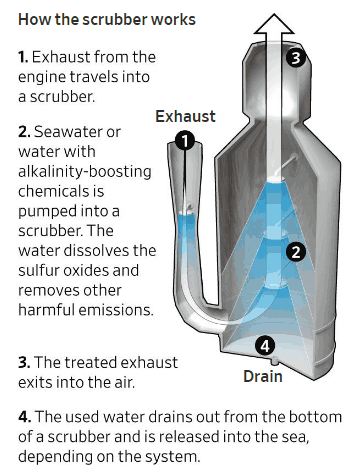In April 2018, the International Maritime Organization (IMO), a regulatory body that sets rules for global shipping, announced new policies for the global ocean shipping sector relative to cleaner fuels, scheduled to go into effect Jan. 1, 2020.
The goal: reduce emissions from high sulfur bunker fuel used by both cargo and container ships by some 80%.
Supply Chain Digest Says... |
|
|
To comply, carriers have three options:
1. Use low sulfur fuel oil (LSFO): This is the most likely option for most owners, both for existing and new build vessels. But the new furl blends - which must reduce the sulfur content from 3.5% to 0.5% - are going to be a lot more expensive than that for the so-called bunker fuel used currently. How much more expensive? No one is quite sure, but estimates tend to be in the 25-40% range.
2. Use exhaust gas cleaning systems (scrubbers): These systems will cost some $3-10 million each – a huge expense. Some carriers such as giant Maersk Line have committed largely to use of scrubbers, with the belief that the payback could be in two years to so – though no one is quite sure, and such a move would take huge capital investments.
3. Install dual fuel engines capable of burning liquid natural gas (LNG): This is mainly an option for new vessels trading on fixed routes or regionally in areas where better LNG bunker facilities are in place and being developed, such as Northern Europe.
This is a big, big deal.
"The new emissions standards will mark the biggest change in ship propulsion since the maritime industry moved from coal to heavy oil early in the 20th century," wrote the Wall Street Journal’s Costas Paris last week.
The huge questions: just how expensive will the new fuel blends really be? And will carriers be able to recoup those additional costs from shippers?
(See More Below)
|
CATEGORY SPONSOR: SOFTEON |
|
|
|
|
|
The costs to the shipping sector was initially set around $20 billion annually. Now those estimates are more in the $50 billion range – a huge number for an industry already suffering from weak finances for many years now.
"We're all going to go bust," Junichiro Ikeda, CEO of then Japanese container carrier MOL, said in 2018.
More recently, Maersk CEO Soren Skou stated that "If the extra costs related to low-sulfur fuel go to shipping companies and end there, it would result in bankruptcies."
Bulk and container carriers hope to pass on the costs using a fuel charge to beneficial cargo owners, with existing vehicles for doing so - but it’s tricky. In recent years of generally low bunker fuel costs, many "all in" contracts that offered cargo moves without a fuel surcharge tied to changes in some bunker fuel price index were put in place. How to add a surcharge back in that case in becomes a question.
How carriers that opt for the scrubber approach will ask shippers to cover those new costs is also a big question, with no real parallel in the past.
Critics Say the Scrubber Remove Sulfur from Emissions Puts into Ocean Waters

Source: Wall Street Journal
If shippers are stuck with paying the billions more in fuel and scrubber costs, the next question is if they will be able to pass their own now higher costs on to customers.
"It is unclear at this point what kind of impact the fuel cost increases will have on consumer goods," Jonathon Gold, vice president of supply chain and customs policy at the National Retail Federation, told the Wall Street Journal last week. "I think this will really depend upon the retailer and what their strategy is to mitigate any potential cost increases."
Despite plans by Maersk and others for scrubbers, Rolf Habben Jansen, CEO of German container shipping carrier Hapag-Lloyd, estimates 90% of the global shipping fleet will do without scrubbers and buy the new fuels.
The one bit of good news: fears there would be major shortages of the new cleaner fuels seem to be ebbing. Several major oil companies now say there will be ample supply at major ports, and just this week Singapore, the world’s largest maritime refueling port, said it has been working with big oil refiners and ship owners and will have no problem procuring sufficient volumes of fuel that is compliant with new industry rules.
How do you think these new rules for ocean shipping will play out? Let us know your thoughts at the Feedback section below.
Your Comments/Feedback
|